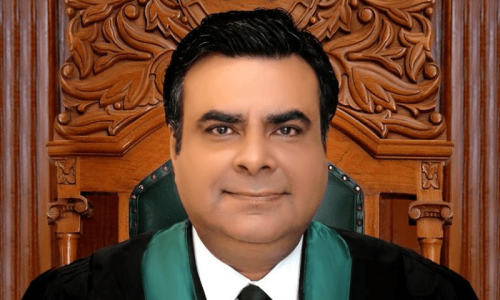HYDERABAD, Dec 20: Visiting scholar of Cornell University of USA and noted archaeologist Prof Dr Parveen Talpur has said that Indus valley civilisation is one of the oldest but least understood civilisations of the world.
Delivering a lecture on "Geometry in Indus Valley Civilisation in Pakistan-2600-1900 BC" organised by Pakistan Study Centre of the University of Sindh on Tuesday, Prof Talpur said that Indus civilisation did reach a mature urban phase but did not enter the stage of statehood hence the absence of evidence suggesting a class structured society with strong kingship.
She said that western world held strange notions about this land, some turned out to be true and some false while many still awaited research. Alexander's mentor Aristotle had told him to look for the common source of Nile and Indus and the legend had it that Alexander looked for the fountain of youth in the Indus region, she said.
Prof Talpur gave a historical background of the excavations made by John Marshal in 1920's, Ernst Mackay in 1930's, Mortimer Wheeler in 1950's and finally George Dales in 1960's. Dr Dales headed a team of University of Berkeley, California and he became the last archaeologist to work on Moenjodaro before the government imposed a ban on further excavations in 1964, she said.
She said that she was still young to join the team at that time but in 1970's when Dr Dales was documenting his finds from Moenjodaro at the excavations and exploration branch of the department of archaeology in Karachi, she began her career and joined the archaeology team.
She said that the ban imposed due to rising water table was a disappointment for researchers. Many relics had to be left in the submerged levels. It was estimated that only one-third of the city had been excavated yet, she said.
She said that another impediment to understanding Indus valley civilisation was the researchers’ failure to decipher the script left behind by the scribes of Moenjodaro and Harappa.
The discovery of Indus seals began in the last quarter of the 19th century with the first seal excavated from Harappa. The issue of Dravidian language represented on the Indus seals was yet to be resolved on the geometrical construction on the patterns of Bhutan seals. Bhutan seals were a small group of seals discovered from Moenjodaro and Harappa and published in the earliest reports of John Marshal and Ernst Mackay, she added.
She said that research scholars were unaware from which cultural levels the seals were discovered but based on the fact that few of such seals had been discovered from Mehargarh or Mundigak which were older, it could be assumed that they preceded the regular seal.
Renowned scholar Dr N A Baloch emphasised on publication of a book on Moenjodaro and Indus valley civilisation in layman’s language and said that due to technical terms in books published on Moenjodaro they were not easy to understand.
Noted educationist Prof Dr G A Allana said that the scholar’s review on Indus civilisation should motivate archaeologists to revisit the sites with open eyes. A large number of archaeologists, educationists, professors and students attended the lecture.















































Dear visitor, the comments section is undergoing an overhaul and will return soon.